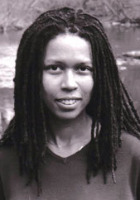Evie Shockley Poems
you put this pen
in my hand and you
take the pen from you put this pen
...
when your mother can rise from her place
on the pew during the early service,
early enough that the sun barely fills the sky
...
i cop a squat on a squared-off log,
to watch you ball on the community center court.
butt numb, i shift my weight
...
i want her tin skin. i want
her militant barbie breast,
resistant, cupped, no, cocked
...
He's as high as a georgia pine, my father'd say, half laughing. southern trees
as measure, metaphor. highways lined with kudzu-covered southern trees.
...
My father: younger, handsome, downright square,
eyes like brown buttons fastening his face
over his soul, mouth not too straight to swear,
...
we make midnight a maquette of the year:
frostlight glinting off snow to solemnize
the vows we offer to ourselves in near
...
only 3 of 100 black boys
entering kindergarten will graduate college—
in the night sky, shooting stars
...
All month this country has careened toward cold
and winter's celebrations: what a star
announced—a birth—and then a chance to fold
...
when i was younger, trees
were green, money was green, money
grew on trees, or trees grew up
...
Evie Shockley's Poems! Who is Evie Shockley?
Evie Shockley is a contemporary African American poet and scholar. She was born on September 20, 1965, in Nashville, Tennessee, and raised in a family of educators. She earned a BA in English from Northwestern University, an MA in African American Studies from the University of California, Los Angeles, and a PhD in English from Duke University.
Shockley has published several collections of poetry, including "a half-red sea" (2006), which won the Hurston/Wright Legacy Award and the PEN/Open Book Award, and "semiautomatic" (2017), which was a finalist for the Pulitzer Prize. Her work explores issues of race, gender, and identity, often using innovative language and form.
In addition to her poetry, Shockley is also a scholar of African American literature and culture. She has taught at several universities, including Rutgers University, the University of Michigan, and the University of Iowa. She has also served as the president of the American Studies Association.
Overall, Evie Shockley is an important voice in contemporary American poetry and a respected scholar of African American studies.
Evie Shockley Poems
Here are a few poems by Evie Shockley:
"a particular arrangement"
what we must do is arrange
the furniture in a new way
the old ways are not working
what we must do is throw out
the old sofa, the old bed,
the old chest of drawers
we cannot use them anymore
they do not fit us
what we must do is buy
new furniture that suits us
furniture that is shaped
like we are, that accommodates
our curves and planes
our twists and turns
what we must do is make
a particular arrangement
that allows us to move
together and apart
that makes room for light
and air, for love and hate
"the president of the united states, again"
the president of the united states, again,
says that he wants to make america great
again, as if america were ever great
for everyone who has ever lived here,
as if america were not built on the backs
of black folks and brown folks and poor folks,
as if america were not a land of stolen
lands and broken treaties and broken bodies,
as if america were not a place where women
are raped and beaten and paid less than men,
as if america were not a place where queer
folks are beaten and killed and denied rights,
as if america were not a place where children
are torn from their parents and put in cages,
as if america were not a place where bombs
fall on innocent people all around the world.
the president of the united states, again,
is lying to us, is trying to take us back
to a time that never was, a time when only
some of us were free and the rest of us
were in chains, a time when only some of us
were citizens and the rest of us were property.
the president of the united states, again,
is a dangerous man, a man who wants to destroy
the very fabric of our nation, a man who wants
to take us back to a time of hate and fear.
we must resist him, we must stand up
to him, we must fight him with all our might.
"thirteenth amendment"
we are not free, not really,
not yet. we are still in chains,
still being punished for the crime
of being black, of being brown,
of being poor, of being different.
the thirteenth amendment abolished
slavery, except as punishment for crime.
so they made up crimes, invented ways
to lock us up and keep us there,
in the fields, in the factories,
in the prisons, in the streets.
they made us work for nothing,
they made us pay for our own chains.
they made us sing songs of freedom
while they beat us, while they shot us,
while they hanged us from the trees.
we are not free, not really,
not yet. we are still in chains,
still fighting for our lives,
still fighting for our rights,
still fighting to be seen,
to be heard, to be loved.
we are not free, not really,
not yet. but we will be.
